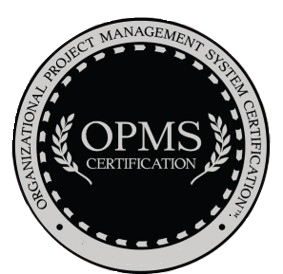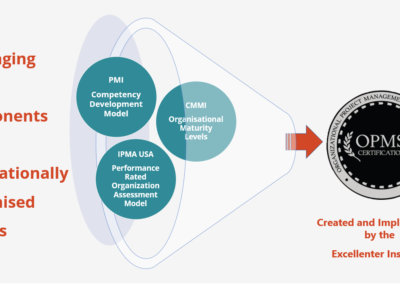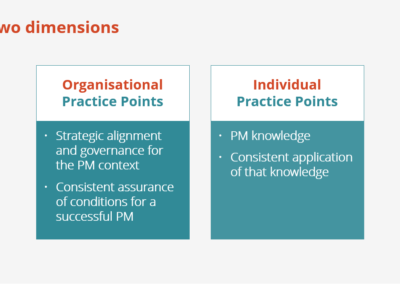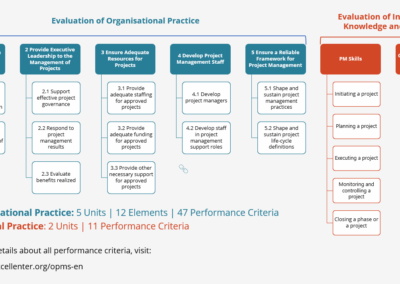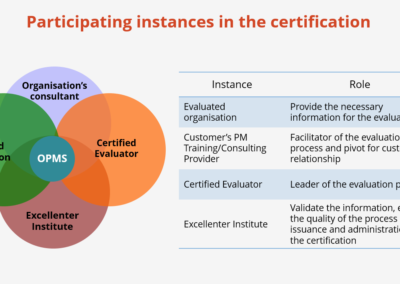Evaluation of Organisational Practice
5 Units | 12 Elements | 47 Performance Criteria
Evaluation of Individual Knowledge and Skills
2 Units | 11 Performance Criteria
Organisational Practice
Individual Practice
6 Project Management Skills
6.1 Initiating a project
6.2 Planning a project
6.3 Executing a project
6.4 Monitoring and controlling a project
6.5 Closing a phase or a project
1.1 Shape and sustain the organization’s strategic direction
1.1.1 Strategic direction is documented and distributed to pertinent stakeholders
1.1.2 Internal and external environments are monitored for circumstances that may require changes to strategic direction
1.1.3 Strategic direction is reviewed periodically and confirmed or updated as appropriate
2.1 Support effective project governance
2.1.1 Policy statements enabling project governance are documented, distributed, maintained, and championed
2.1.2 Roles and responsibilities are defined, documented, distributed, maintained, and followed
2.1.3 Information about project status is current, accurate, and distributed
2.1.4 Terminology involved in the management of projects is used with shared understanding
3.1 Provide adequate staffing for approved projects
3.1.1 Project staffing forecasts are reflected in organizational staffing plans
3.1.2 Project staffing needs are agreed to as part of the project approval process
3.1.3 Staff are made available to projects as agreed
3.1.4 Staffing plans and staff needs are updated in response to changes in project plans or project results
3.1.5 Staffing inadequacies are identified and addressed
4.1 Develop project managers
4.1.1 Project manager selection criteria are documented, distributed, and followed
4.1.2 Knowledge and skill needs for project managers are documented and distributed
4.1.3 Project managers are evaluated against performance metrics that they can influence
4.1.4 Good project manager performance is recognized, and poor performance is addressed
5.1 Shape and sustain project management practices
5.1.1 Project management practices are defined for each major category of product or service
5.1.2 Project management practices are documented, followed, and distributed to pertinent stakeholders
5.1.3 Project management practices are reviewed regularly, and improvement opportunities as well as deficiencies are identified and addressed
7 General Management & Leadership Skills
7.1 Communicating
7.2 Leading
7.3 Managing
7.4 Cognitive ability
7.5 Effectiveness
7.6 Professionalism
1.2 Manage the organization’s overall portfolio of projects
1.2.1 Project selection criteria and project prioritization criteria are derived from the current strategic direction, documented, and used
1.2.2 Guidance for maintaining balance within the overall portfolio of projects is derived from the current strategic direction, documented, and applied
1.2.3 Revisions to the organization’s overall portfolio of projects are documented and distributed to pertinent stakeholders
2.2 Respond to project management results
2.2.1 Project management success criteria are documented and distributed to pertinent stakeholders on all significant projects
2.2.2 Interim project management results are monitored, and project direction is confirmed or modified as appropriate
2.2.3 Interim and final project management results are evaluated against project management success criteria
2.2.4 Lessons learned are shared and applied
3.2 Provide adequate funding for approved projects
3.2.1 Forecasts for project funding are included in organizational budgets
3.2.2 Expected project funding needs are agreed to as part of the project approval process
3.2.3 Funding needs are updated in response to changes in project plans or project results
3.2.4 Funds are made available to projects as agreed
3.2.5 Funding inadequacies are identified and addressed
4.2 Develop staff in project management support roles
4.2.1 Knowledge and skill needs for project management support roles are documented and distributed
4.2.2 Individuals in project management support roles are evaluated against performance metrics that they can influence
4.2.3 Good performance in project management support roles is recognized, and poor performance is addressed
5.2 Shape and sustain project life-cycle definitions
5.2.1 Project life-cycles are defined for each major type of product or service
5.2.2 Project life-cycle definitions are documented, followed, and distributed to pertinent stakeholders
5.2.3 Project life-cycle go/no-go decisions are based on current, realistic business cases
5.2.4 Project life-cycles definitions are reviewed regularly, and improvement opportunities as well as deficiencies are identified and addressed
2.3 Evaluate benefits realized
2.3.1 Expected benefits are measurable, documented, and agreed to by pertinent stakeholders
2.3.2 Plans for evaluating benefits are developed and implemented
2.3.3 Responsibility for evaluating benefits is assigned and accepted
2.3.4 Variances in benefits realized are addressed
3.3 Provide other necessary support for approved projects
3.3.1 Forecasts of other necessary support needed by projects are included in organizational plans
3.3.2 Other necessary support needed by projects is agreed to as part of the project approval process
3.3.3 Other necessary support needed by projects is provided as agreed
3.3.4 Other necessary support needs are updated in response to changes in project plans or project results
3.3.5 Inadequacies in other necessary support are identified and addressed
Get In Touch
Excellenter Institute
Langemarckstrasse 112
79100 Freiburg, Germany
+49 761 156 21 50
office@excellenter.org

